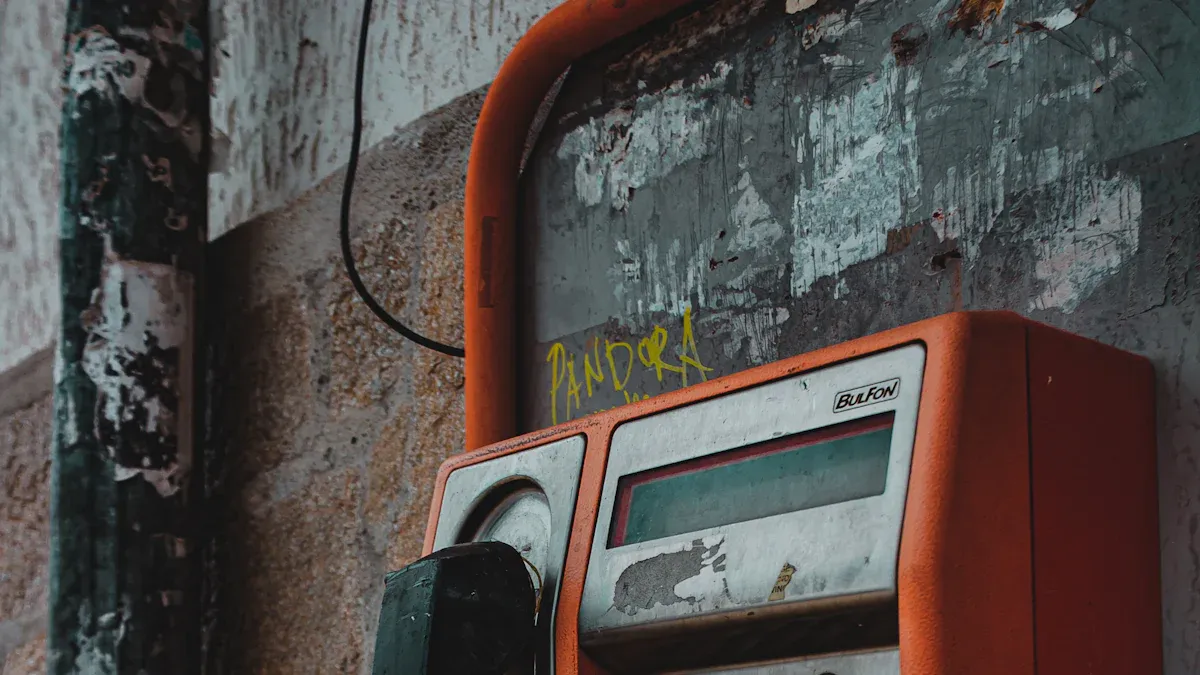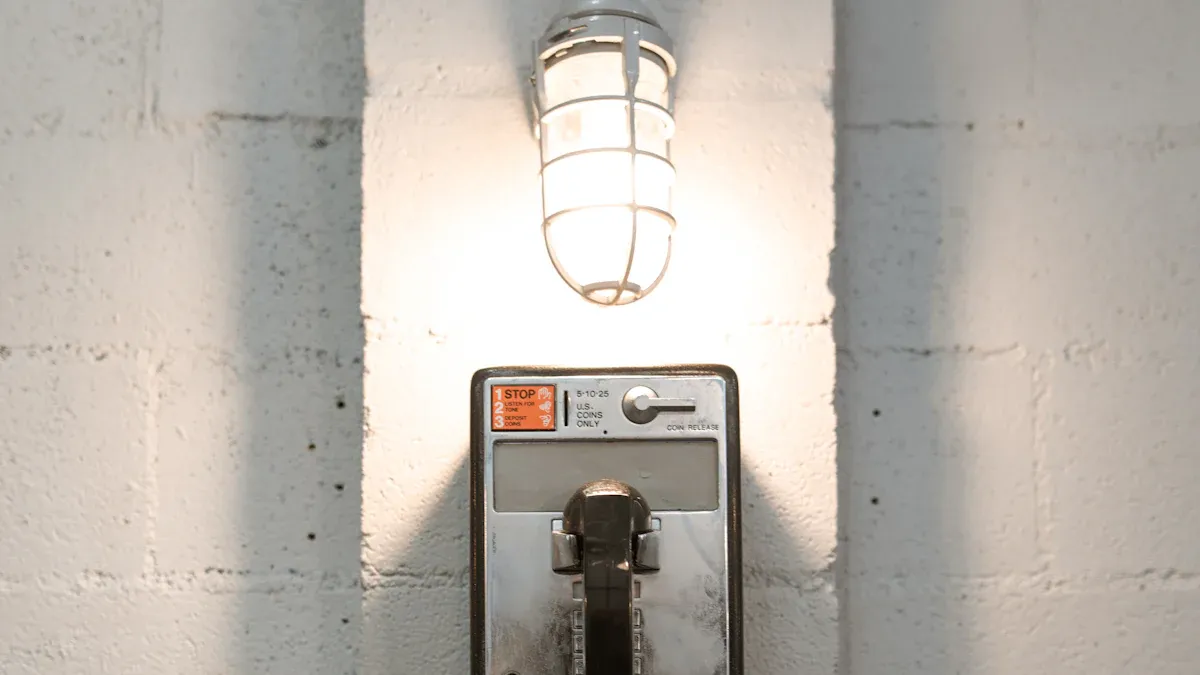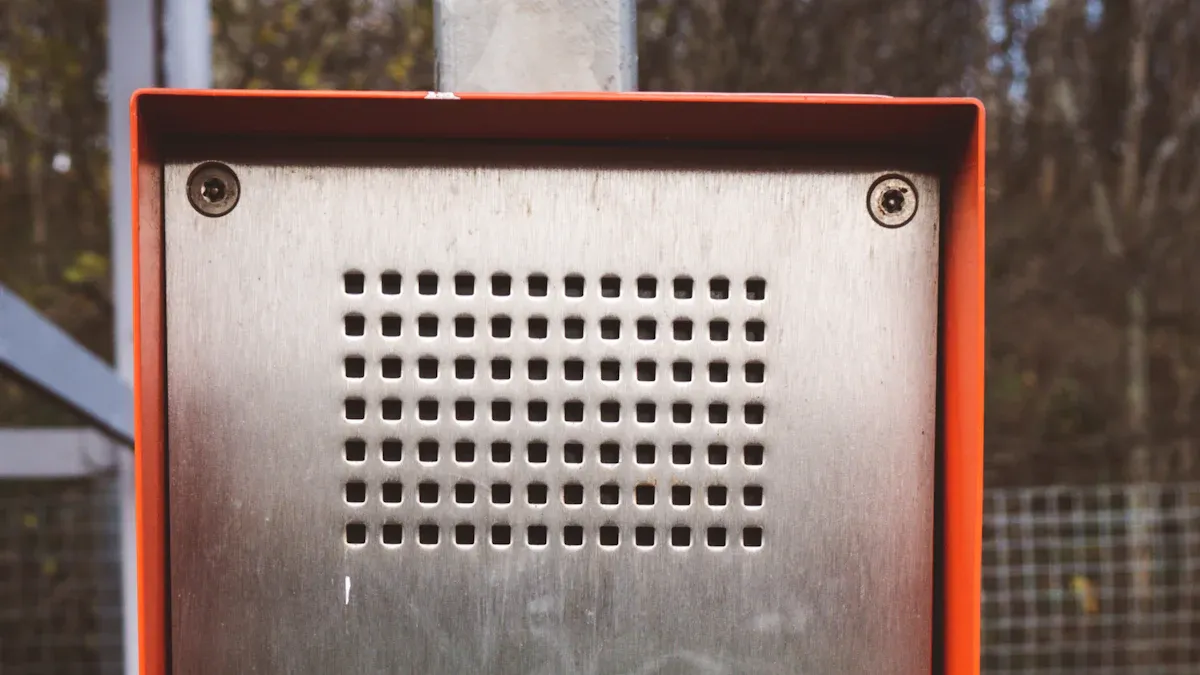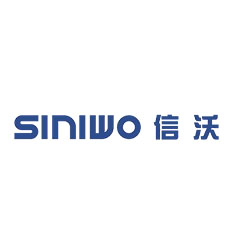
Extreme weather can disrupt communication, but you need reliable tools to stay connected. An industrial telephone ensures durability in harsh conditions. Models like the IP65 outdoor telephone or a waterproof telephone withstand rain, snow, and dust. A weatherproof telephone handset offers robust performance, making it essential for outdoor and emergency use.
Key Takeaways
- Choose a strong industrial phone. Pick ones made of stainless steel or tough plastic to last in rough conditions.
- Look at the IP rating for weather safety. An IP65 or higher keeps out water and dust, helping the phone work well in bad weather.
- Think about emergency tools like SOS buttons and loud alarms. These can help in emergencies and keep people safe outside.
Key Features to Consider
Durability and Build Quality
When choosing an industrial telephone, durability should be your top priority. These devices often operate in challenging environments, so they must withstand physical impacts and wear over time. Look for telephones made from high-quality materials like stainless steel or reinforced polycarbonate. These materials resist cracking, bending, and other forms of damage. A sturdy build ensures the phone remains functional even in the harshest conditions.
Tip: Check for certifications like IK ratings, which measure impact resistance. Higher ratings mean better protection against physical damage.
Weather Resistance (IP Ratings and Material)
Weather resistance is another critical feature. Industrial telephones often face rain, snow, and dust, so they need proper sealing to keep out moisture and debris. Look for IP ratings, which indicate the level of protection against water and dust. For extreme weather, an IP65 or higher rating is ideal. Materials like corrosion-resistant metals or UV-stabilized plastics also enhance the phone’s ability to endure outdoor conditions.
Emergency Functionalities (e.g., SOS buttons, loud alarms)
In emergencies, quick communication can save lives. Many industrial telephones come with features like SOS buttons, which allow you to call for help instantly. Loud alarms or flashing lights can also alert nearby workers to emergencies. These functionalities are especially useful in noisy or remote locations where standard communication methods might fail.
Power Source and Connectivity Options
Power and connectivity options determine how reliable your industrial telephone will be. Some models use wired connections, while others rely on GSM or VoIP technology. Choose a power source that suits your needs, whether it’s battery-operated, solar-powered, or connected to a main power supply. Reliable connectivity ensures uninterrupted communication, even during power outages or network disruptions.
Top Industrial Telephones for Extreme Weather

InduTel Weatherproof Phone (Pros, Cons, Pricing)
The InduTel Weatherproof Phone is a reliable choice for outdoor environments. Its rugged design ensures durability, even in heavy rain or snow. This model features an IP66 rating, providing excellent protection against water and dust. You’ll appreciate its clear audio quality, which remains consistent in noisy settings.
Pros:
- High weather resistance with IP66 certification.
- Durable build using corrosion-resistant materials.
- Easy installation with flexible mounting options.
Cons:
- Limited connectivity options (wired only).
- Slightly higher price compared to similar models.
Pricing:
The InduTel Weatherproof Phone typically costs around $300-$350, making it a mid-range option for those seeking a dependable industrial telephone.
ETP-400D Emergency Telephone (Pros, Cons, Pricing)
The ETP-400D Emergency Telephone is designed for critical situations. It includes an SOS button and a loud alarm to ensure quick response during emergencies. Its bright yellow casing makes it easy to locate in low-visibility conditions.
Pros:
- Emergency features like SOS and alarm systems.
- Durable and weather-resistant design.
- Highly visible in outdoor environments.
Cons:
- Requires a wired power source.
- Bulkier design may limit placement options.
Pricing:
This model is priced between $400-$450, reflecting its advanced emergency functionalities.
JWAT702 GSM Telephone (Pros, Cons, Pricing)
The JWAT702 GSM Telephone offers advanced connectivity for remote locations. Its GSM technology ensures reliable communication without the need for wired connections. This phone also boasts an IP67 rating, making it highly resistant to water and dust.
Pros:
- Wireless GSM connectivity for flexible use.
- High waterproofing and dust resistance.
- Compact and lightweight design.
Cons:
- Requires a stable GSM network to operate.
- Higher initial cost compared to wired models.
Pricing:
Expect to pay around $500-$550 for the JWAT702 GSM Telephone, ideal for extreme weather conditions.
Guardian Telecom Rugged Model (Pros, Cons, Pricing)
The Guardian Telecom Rugged Model is built for industrial applications. Its robust construction withstands impacts, corrosion, and extreme temperatures. This industrial telephone is perfect for factories, mines, and other demanding environments.
Pros:
- Exceptional durability and impact resistance.
- Operates in extreme heat and cold.
- Long lifespan with minimal maintenance.
Cons:
- Limited portability due to its heavy build.
- Higher price point compared to other models.
Pricing:
This model is priced at $600-$700, offering premium durability for industrial use.
Performance in Extreme Conditions

Functionality in Heavy Rain and Snow
An industrial telephone must perform reliably in heavy rain or snow. You should look for models with high IP ratings, such as IP66 or IP67, which ensure water resistance. These phones often feature sealed enclosures that prevent moisture from entering. For snowy conditions, anti-freeze coatings or materials that resist freezing temperatures are essential. Phones with heated components can also prevent ice buildup, ensuring uninterrupted communication.
Tip: Always test the phone in simulated wet conditions before installation to confirm its performance.
Performance in Extreme Heat and Cold
Extreme temperatures can damage standard communication devices, but industrial telephones are built to endure. In hot climates, materials like UV-stabilized plastics prevent warping or discoloration. For cold environments, models designed to operate at sub-zero temperatures are crucial. Some phones include internal heating systems to maintain functionality in freezing weather. You should also consider phones with wide operating temperature ranges, such as -40°F to 140°F, for maximum reliability.
Resistance to Dust, Corrosion, and Impact
Dust and corrosion can compromise a phone’s performance over time. Industrial telephones with IP ratings of IP65 or higher resist dust infiltration. Corrosion-resistant materials, such as stainless steel or powder-coated metals, protect against rust in humid or salty environments. Impact resistance is equally important. Phones with IK ratings, which measure impact protection, can withstand accidental drops or heavy blows. This durability ensures the phone remains operational in tough industrial settings.
Ease of Use and Installation
User-Friendly Features (e.g., large buttons, clear audio)
An industrial telephone should prioritize ease of use, especially in high-stress or emergency situations. Features like large, tactile buttons make dialing easier, even when you wear gloves. Clear audio quality ensures that conversations remain understandable, even in noisy environments like factories or construction sites. Some models also include backlit keypads, which are helpful in low-light conditions.
Tip: Choose a phone with adjustable volume controls to accommodate different noise levels in your work environment.
Installation Requirements and Flexibility
Installing an industrial telephone should not require excessive effort. Many models come with flexible mounting options, allowing you to install them on walls, poles, or other surfaces. Some phones include pre-drilled holes and mounting kits to simplify the process. Wireless models, like those with GSM connectivity, eliminate the need for extensive wiring, making them ideal for remote locations.
Note: Before installation, ensure the phone’s location provides adequate protection from direct sunlight or heavy debris to maximize its lifespan.
Maintenance and Longevity
Regular maintenance ensures your industrial telephone remains functional for years. Look for models with sealed enclosures that prevent dust and moisture from entering. Phones made from corrosion-resistant materials require less upkeep, especially in humid or salty environments. Periodically check for wear and tear, such as damaged cables or buttons, to address issues before they escalate.
Pro Tip: Keep a maintenance log to track inspections and repairs, ensuring your phone stays in optimal condition.
Value for Money
Cost vs. Features Comparison
When evaluating an industrial telephone, you should compare its cost with the features it offers. A higher price often reflects advanced functionalities like GSM connectivity, SOS buttons, or superior weather resistance. However, not all expensive models provide the best value. For example, a mid-range phone with an IP66 rating and durable materials might meet your needs without unnecessary extras. Create a checklist of essential features and match them to your budget. This approach ensures you pay only for what you need.
Long-Term Durability and ROI
Investing in a durable industrial telephone saves money over time. Phones built with corrosion-resistant metals or reinforced plastics last longer, reducing replacement costs. Models with high IP and IK ratings resist environmental damage and physical impacts, ensuring consistent performance. A reliable phone minimizes downtime, which can save you money in critical operations. Consider the long-term return on investment (ROI) when choosing a model. Spending more upfront often results in lower maintenance and replacement expenses.
Each industrial telephone serves a specific purpose. The InduTel Weatherproof Phone works best for general outdoor use. The ETP-400D excels in emergencies with its SOS features. The JWAT702 GSM Telephone handles extreme weather with advanced waterproofing. For industrial applications, the Guardian Telecom model offers unmatched durability. Choosing the right phone ensures reliable communication in harsh conditions.
FAQ
What is the difference between IP65 and IP67 ratings?
IP65 protects against water jets, while IP67 ensures protection during temporary submersion. Both resist dust completely, making them ideal for harsh environments.
Tip: Always choose a rating based on your specific weather conditions.
Can industrial telephones work without electricity?
Yes, some models use batteries or solar power. GSM-based phones also operate independently of wired electricity, ensuring communication during power outages.
How do I maintain an industrial telephone?
Clean the exterior regularly and inspect for damage. Check cables and buttons for wear. Use a maintenance log to track repairs and replacements.
🛠️ Pro Tip: Schedule periodic inspections to avoid unexpected failures.


